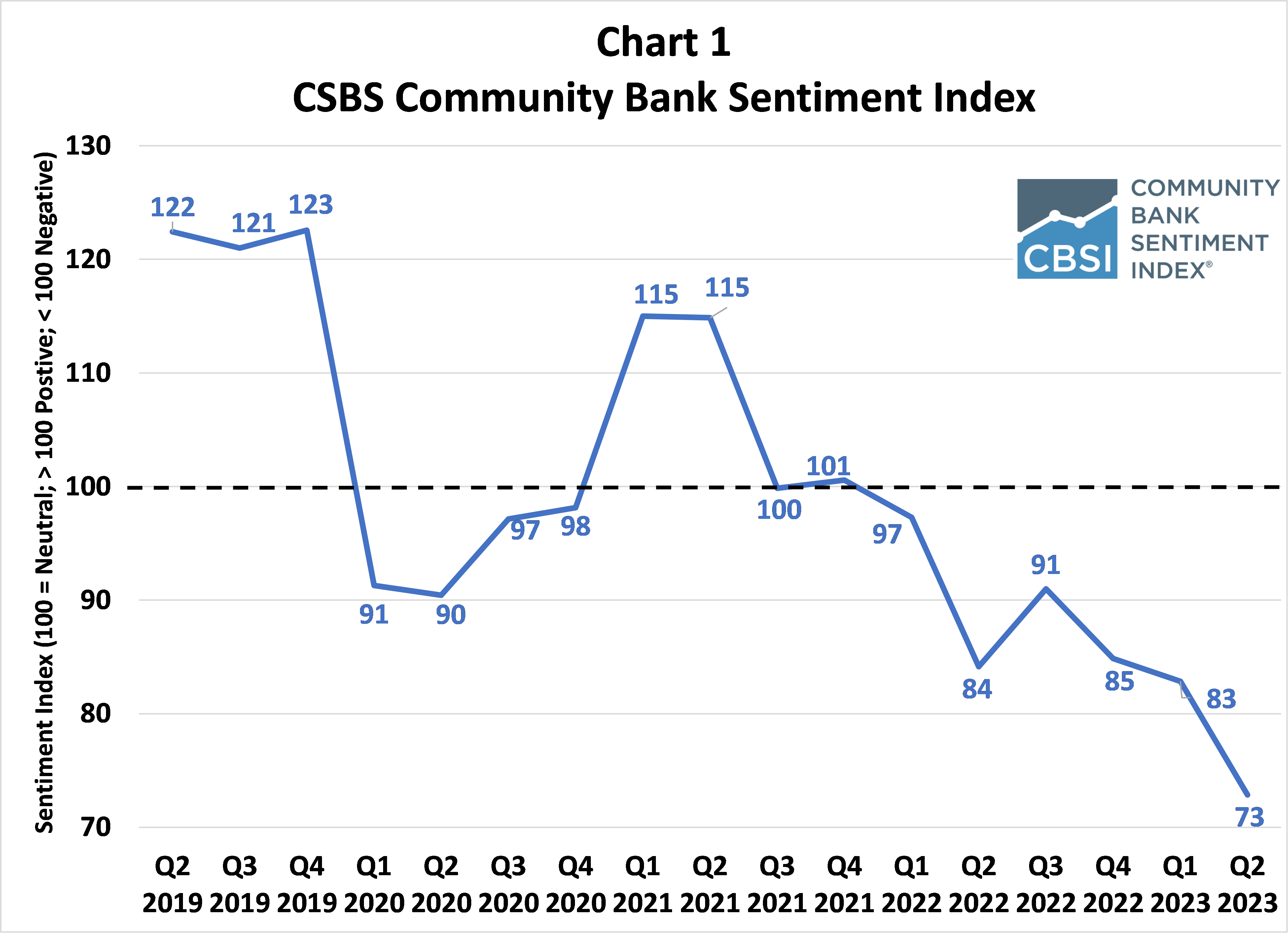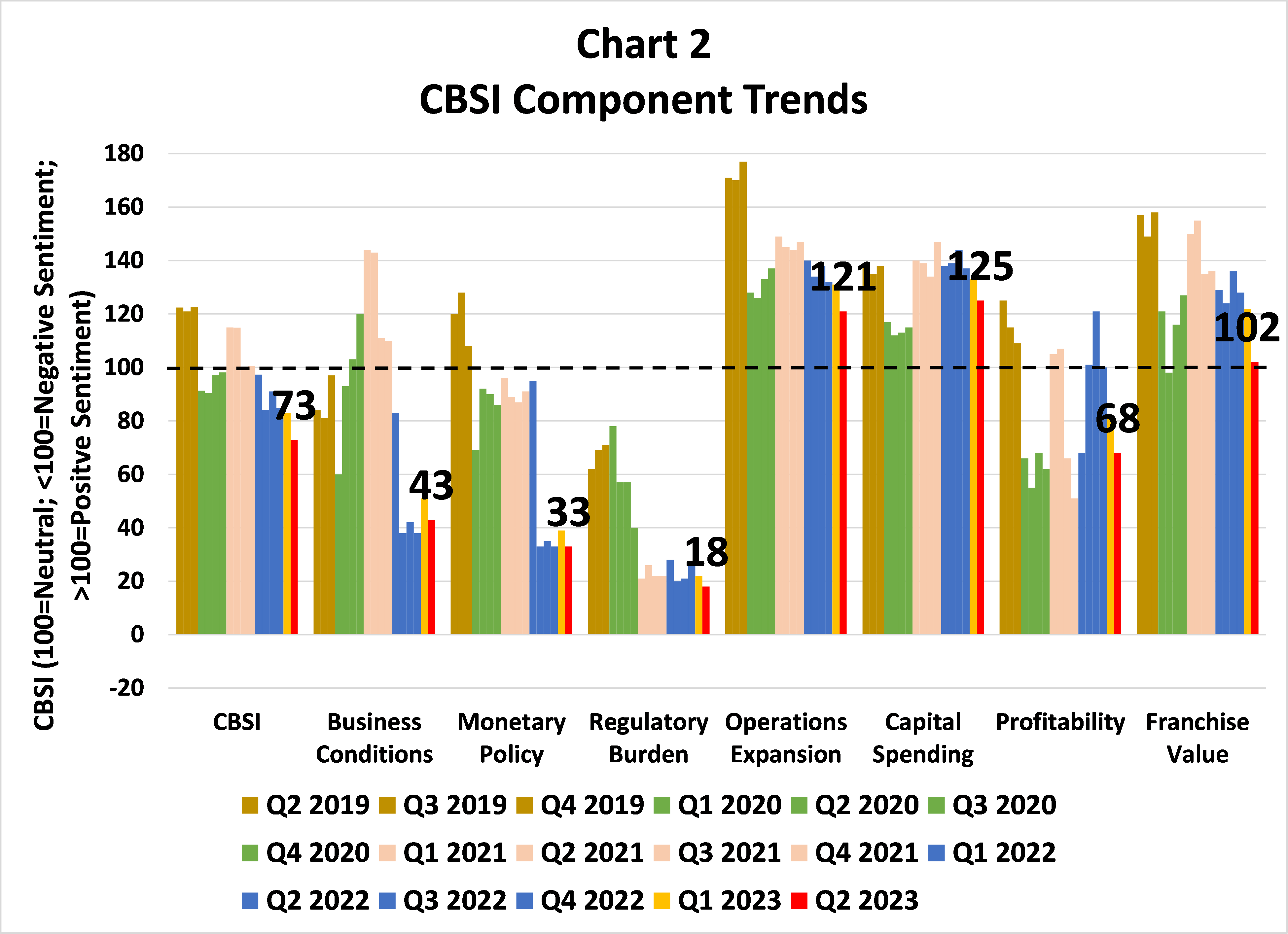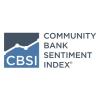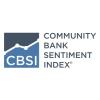Worse Than Dismal: Community Banker Sentiment at Another Record Low
By CSBS Chief Economist Thomas F. Siems, Ph.D.
With the CSBS second quarter 2023 Community Bank Sentiment Index (CBSI) dropping again to another record low, community banker pessimism on the outlook for the U.S. economy appears to have fallen into a dark abyss. All seven components that comprise the index fell from the previous quarter, with three indicators setting record lows: regulatory burden, monetary policy, and operations expansion. And like the last two surveys, 95% of community bankers say the U.S. economy is already in a recession.
Chart 1 shows that the headline number from the second quarter 2023 CBSI was 73, down 10 points from the first quarter 2023 survey and 11 points lower than one year ago. The neutral level is 100, with values below 100 indicating community bankers hold a negative sentiment and values above 100 signaling a positive outlook.
The second quarter 2023 reading is the sixth consecutive quarterly reading below 100, with the overall index down 42 points from two years ago when it reached a cyclical peak of 115 in the second quarter of 2021. Since that time, the war in Ukraine, higher inflation, rapid interest rate increases, a few high-profile bank failures and the federal debt borrowing limit have dominated news headlines.

Four components drove the index sharply lower this quarter future regulatory burden, monetary policy expectations, the outlook for business condition, and future profitability. Chart 2 shows the component trends for the seven indicators that comprise the CBSI.
All seven components moved lower compared to the first quarter 2023 values, with the future franchise value metric declining the most from 122 last quarter to 102 this quarter. The future profitability indicator also saw another large decline from the previous quarter, falling 14 points from 82 to 68 in the second quarter.

Using the interactive dashboard on the CBSI website, we find that the aggregated CBSI for the 53% of bankers expecting lower profitability was 54, compared to 107 for the 21% expecting higher profitability. While both groups of bankers hold a pessimistic view on future business conditions and the future impact from monetary policy actions, the bankers expecting lower profitability were significantly more pessimistic with a reading of 32 versus 59 for future business conditions and 25 versus 54 for the monetary policy component. The greatest difference in the two groups was for future franchise value: bankers expecting lower profitability had a franchise value score of 72; whereas bankers expecting higher profitability expect their franchise value to improve, with a reading of 148.
According to the CSBS second quarter 2023 survey, 95% of community bankers already believe the economy is in a recession. In open-ended comments, several bankers warned that higher interest rates will eventually restrict economic growth, if it has not already. Some comments include:
- “A continued higher rate environment will affect all aspects of the banking industry, including stress on the existing loan portfolio and fixed rate securities holdings.”
- “We are in a period of stagflation which may persist for a few years. Of great concern is the potential for a resurgence of inflation which would cause the Fed to respond with significantly higher interest rates.”
- “Higher short term interest rates are stifling economic activity and leading to a recession. The effects may not be quantifiable yet by economists, but community bankers are observing it in real time.”
- “The yield curve anticipates a recession.”
While concerns like these have certainly contributed to the continuing erosion of community banker sentiment, some good news from the current survey is that community bankers continue to maintain or escalate capital spending plans. With a current reading of 125 in this component, 41% of community bankers plan to increase capital spending on facilities and operations in the next 12 months, 43% plan to keep it the same and 16% plan to decrease capital spending.
So, despite overall pessimism, community bankers continue to value the importance of furthering technological initiatives that improve efficiencies, expanding facilities and digital infrastructures to improve customer service and outreach and providing better computer security to protect against cyberattacks, as well as the need to stay competitive and not get left behind.
And this is ultimately good news for households and businesses that rely on their local community bank to help them navigate the current economic environment and help them with their financial decisions.
- Press Releases
Community Banker Optimism Reaches New High
Oct 2, 2025
- Blog post
Letter of Appreciation to Jonathan A. Scott
Aug 20, 2025
- Press Releases
Community Bankers Maintain Positive Economic Outlook
Jul 8, 2025
Get Updates
Subscribe to CSBS
Stay up to date with the CSBS newsletter


